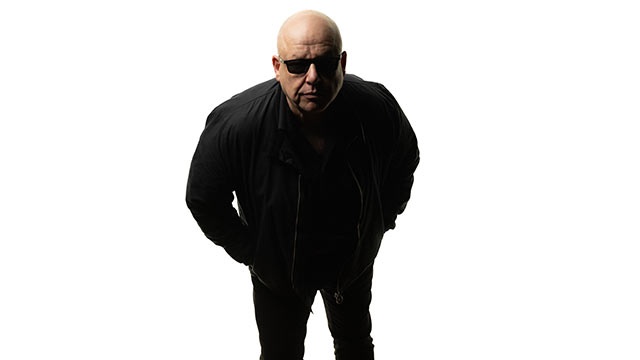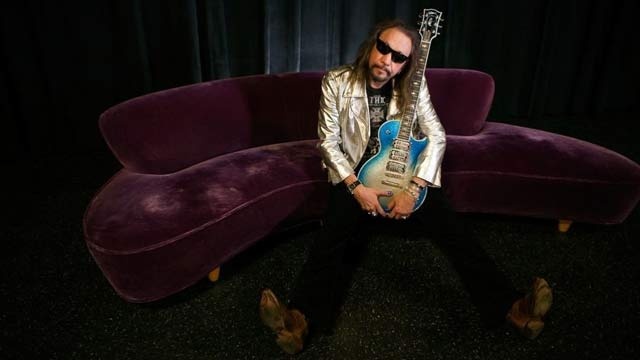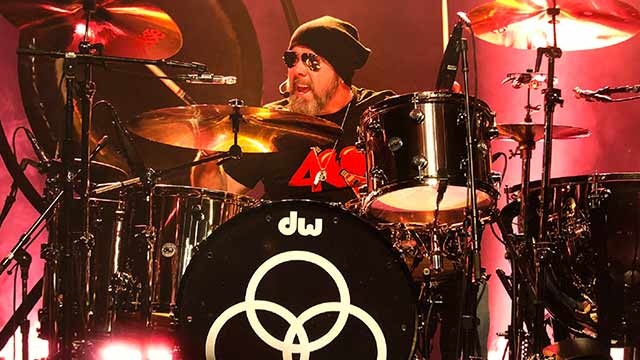Luckily for fans, the Pixies’ singer, guitarist, and main songwriter, Frank Black, was still penning great tunes – which comprised his first two classic solo albums, 1993’s self-titled debut and 1994’s Teenager of the Year.
And this year, Black (real name: Charles Thompson) will be revisiting this era with the Teenager of the Year 2025 Tour, which will include the album being played in its entirety, as well as selections from his aforementioned solo debut.
Black spoke with AllMusic shortly before the tour’s January 15th launch, and was willing to look back on his early solo years, how the music business has changed, and if there could ever be another alt-rock uprising like there was in the early ’90s.
Let’s start by discussing the Teenager of the Year Tour. What can audiences expect?
“They’re going to get a kind of nuanced performance, because the people that are playing it – for the most part, with the exception of one guy – actually played all of the instruments that we’re going to do for our encore performance, as it were. We’re going to play the album, we’re going to play it as true as we can. And I suppose it’s not going to be exact.”
“‘What’s going to be different, Charles? You say it’s not going to be exact?’ I would say at 22 songs that’s about an hour and 5 minutes. Maybe an hour and 10 minutes if I throw a couple of jokes in there, and say good evening. That’s probably not quite enough of an evening out, I think. So, how are we going to augment this performance?”
“There was another solo record that came out just one year before Teenager of the Year. Frank Black it’s called. And most of the musicians that are on Teenager were involved on that record, so we’ll do we’ll do some material from that record, too. Because it’s more or less from the same ‘season,’ y’know? Or close to it.”
“And then there’s an association there, because Teenager of the Year was the second solo record by the artist called Frank Black. And Frank Black is the first release, so there’s some continuity there. So, we’ll flesh out that performance with some stuff from the first record is what I’m trying to say. Because I think it makes sense. There’s a few numbers from that first record, like ‘Los Angeles,’ ‘I Heard Ramona Sing.’ Those are the two most notable I think, the most memorable. And we’ll be doing that stuff.”
What do you recall about the writing and recording of the Teenager of the Year album? Was it a similar or different experience compared to your first solo album?
“I think there was a little bit of a spirit of I was kind of ‘getting away with something.’ Because I was in a band and I broke up the band – much to the disapproval of everyone around me in my world, and certainly to the audience. So, I suppose my most strong detractors would have suggested that I then and there retire. ‘You broke up the band. Fuck you. We don’t want to hear from you anymore.’ That would be some of the audience or the critics or whoever.”
“Of course, probably more of the audience and observers would have at that point been looking at my output as an artist or whatever my position is so to speak in the business, and would have said, ‘OK, what do you have to say now?’ They would have reserved their judgment somewhat and waited for my next musical statement – my next solo record. Including the record company, because I still had a contractual obligation to 4AD Records to give them a couple more records.”
“A lot of singer-songwriters get stuck in this position – you break up the band, but what happens is your contract says that since you’re the principal songwriter, since you’re the principal force or whatever that people associate with the act, ‘You owe us a couple of more records.’ So, I was still under contract to 4AD Records, and I had something to prove as it were, to this part of the audience, that I was trying to say, ‘Hey, I still exist. I’m not in that band anymore. But I still exist.’ And so I think that there was a sense of freedom – a limited freedom. I didn’t have the weight, if you will, a responsibility or the sort of the collective ambition of a band to contend with. It was just me now.”
“But I did have a contract that I had to honor. And I had a career that I had to honor. So, when I say I had full freedom to do whatever the hell I wanted to, yeah I did, and I always have had creative freedom. And I’m thankful for that. I appreciate that about my career. I’ve had contracts that have bound me in some ways, but I’ve never had a creative boundary. In other words, I’ve never signed a contract that said, ‘You must have your music approved by somebody.’ You do what you want – I’ve always had that.”
What as the first step with getting the ball rolling?
“For the first time in my career, the head of the record company – a nice guy called Ivo Watts-Russell – he decided to visit me on my recording session in Los Angeles. They were all the way back in London, but he said, ‘I’m coming over for a visit to check out what you’re doing.’ And while we were plenty proud of what we were doing musically, we knew that we had momentum. We had some ‘thing’ that we were exploring. When I say we, I mean Eric Feldman my producer and I. But we hadn’t recorded the so-called ‘libretto.’ We had not put any vocals down.”
“So, for people listening to music, when you hear rock n’ roll music without the singer, it doesn’t really make sense to them. It isn’t finished, it’s not even a song if you don’t have the guy singing on it. And Eric and I understand this kind of dynamic, so we were in a bit of a quandary, because, ‘Holy fuck! The guy is showing up tomorrow! He’s flying in and he wants to check out the stuff’.”
“And so I ran down to the delicatessen there in Burbank, and I ordered a matzo ball soup, that I could sit with for a very long time. And I proceeded to write lyrics to several of the of the songs, including I think ‘Los Angeles’ and maybe ‘I Heard Ramona Sing,’ and maybe a couple of other songs, like ‘Ten Percenter.’ Whatever were my ‘a list’ from that record. And I finished some of the material just in a mad dash for this guy’s arrival. And I ran back to the studio after my soup, and I sang the songs and it seemed good. And he showed up, and he went, ‘Wow, sounds great!’
“So, when we started Teenager of the Year, it had this similar kind of bravado. It’s like, ‘OK, let’s go and then let’s make another one.’ I was really having a good time doing this without being saddled with a band. And I say that not in a disparaging way, but that’s what it is when it’s a band. When it’s a band, it’s like, you gotta ask even the tambourine player, ‘Well, what do you think?’ You want everyone to feel good about it, right? But not having that sounding board and to be able to just be on my own I found very liberating, and I loved it.”
“So, we started Teenager of the Year, and we upped our game – we went to nicer studios and maybe we were feeling ambitious. When we got to about an album’s worth of material, the engineer – who was also a co-producer on the project, an English guy called Al Clay – had to move on to his next project. So he said, ‘Well look, my time is done here, guys. Should we call it a day and wrap up this record?’ And he mixed us a version of the record with I think it had about 11 or 12 songs on it. And we liked it, but Eric and I were still kind of…we hadn’t really ‘scratched all of our itches’ yet. We were having too much fun.”
“So, we said, ‘Al, we love you. Goodbye and go off to your next project. But we’re going to keep working.’ And there was no news from London about them coming to visit us – they had other fish to fry. And so it was kind of like, ‘It’s coming along great, London…but we need more money to finish.’ Their reply was, ‘Fine. OK.’ So, we got the green light to continue, and we went to more studios and we wrote more songs. It felt very honest, it was not like we had lost our way. It was like really about enjoying the process and not really wanting to just call it a day until we felt like we had made our big statement.”
What do you recall about the song “Headache,” off Teenager of the Year? I remember that tune was popular on alt-rock radio.
“I know the studio that we were at – it was Dave Stewart’s studio, a place called the Carriage House. He built a carriage house studio out behind his property there in LA. And I can’t remember if ‘Headache’ was in the first batch, but it was the new song that showed up one morning – right as we were wrapping up that session.”
“But that was certainly the song that was going to usher in the next wave of creativity, if you will. We had done the 11 or 12 songs, and ‘Headache’ showed up and it was this kind of…Creedence Clearwater kind of a vibe or something. We really liked it. We just loved the vibe of the track and Eric and I were excited about it.”
“And it didn’t sound like any of the other tracks that we had recorded up until that moment, so that was our signal that ‘Oh no, this is not done. We’re continuing.’ It represented a new breath of air or something. ‘It was like, ‘Oh, this ‘Headache’ song showed up…what’s behind that? That song dictated that we would continue.”
Can a movement like ’90s alt-rock in the early ’90s ever happen again?
“One thing that was going on – and I don’t think that this is necessary to make good music – was that people hadn’t started streaming music. The compact disc had certainly taken over, and vinyl was completely dead at that moment. But artists were still involved in very traditional kind of relationships with record companies. And when I say ‘traditional,’ I mean in terms of the financial connections.”
“And also the record companies, even though vinyl was dead and there was this whiff of the Internet and the future and ‘What does that all look like?’, they were still selling records by the truckload. The Pixies, the last couple of years of our first part of our career there before we broke up, we got involved in some distribution with a major label. It was Elektra Records in the United States. As people perceived it then as, ‘Oh, you ‘graduated’ from the indies to the majors.’ They had this whole ‘indie versus majors thing’.”
“So, the record companies – whether they were indie or major – were still kind of judging everything based on how many boxes of records were going out the door. So, of course your major artists were releasing records and they were selling millions of copies around the world. People still sold millions of records. Hundreds of thousands of records. And so a band like the Pixies, who were perceived as slowly going upward moving from the indies to the majors – ‘Oh, we’re playing a bigger hall this tour.’ But it was still perceived as a kind of a failure if you put out a record and you sold 200,000 copies. They’d be like, ‘Eh…you’re still in the game, but you only sold 200,000 copies.’ The numbers that people would kill for now.”
“People were still throwing money at the situation. To give you an example of how people still throw money at the situation, the Pixies were maybe considered a struggling act by our major record players around the time 1990/1991. We made Bossanova and Trompe le Monde, I remember on Trompe le Monde, they hooked us up with a with a popular filmmaker who was getting a lot of action over there on MTV – a guy called David Wild.”
“And filmmaking and the production value of videomaking at that time was still such that people were pretty convinced that if you wanted to have any kind of fighting chance promoting your records via video, that you had to spend another 100,000/200,000/300,000 dollars. They had no problem with it! They would just fucking sign the check – ‘Here’s $200,000. You need to make a video to do this properly. If you’re going be taken seriously, you’ve got to spend $200,000 minimum on a video.’ And we’re like, ‘$200,000? Jesus Christ. That’s almost as much as we spent on the record – to make one little fucking clip’!”
“So, there was an atmosphere of the record companies, and everybody still had a lot of money in the coffers. They were throwing money at situations, because they were trying to hold on to this sort of changing [business model]. ‘We’re not
I think for a while in the ’80s and the ’90s, a lot of artists were kind of in a housing bubble. It was a little bit artificial. There was something about all of that, that was artificially held together. And I think that digital and the internet came along and popped that, the bubble burst, and it was over.
selling any more vinyl records – that is dead and over with. People are only buying CD’s.’ Streaming hadn’t started yet, but people knew you could go on the internet and people could get bootlegs. Everyone was worried about the bootleggers and the mp3’s.”
“So, I would say I don’t think anything like that could be recreated right now. Because you did have that infusion of cash. It was the last gasp of that – of all that cash flowing into even the indie bands’ pockets. You don’t have that now. Which, I think is probably better for the art. But there’s nothing wrong with spending a lot of money on a record. You might come out with a bad record…but you might come out with a really great record, too. Some people crawl down the rabbit hole and they spend three years working on a record and a gazillion dollars, and lo and behold, they do come up with some magical thing that saves the day.”
“I guess what I’m trying to say is I don’t think that could be replicated now. The whole dynamic of how things are patronized and how things are paid for and how people are making their money out of all of this has all shifted. And money does change things. Money does affect things – for bad and for good. I would say we’re in a different world financially and contractually than we were 30 years ago. For all artists – whether they’re seasoned artists or whether they’re brand new people – it’s all different now. The way contracts are done, the expectations, where people are making their money.”
“It’s still show biz – we’re still hawking something here. But a lot of the dynamics had shifted in big ways. So, I think that was the last moment that the old record company system, the way that things worked. That was the last time – early ’90s. After that, it all shifted. A lot of people think of it in terms of falling apart. Certainly, the record companies would think about it that way, ‘Now we don’t sell records. People can just go on the internet and hear music for free.’ From the artists’ point of view, ‘Oh, I don’t make money anymore. I don’t sell so many records.’ It’s all different. But I don’t really have a negative take on that. I just think that’s show biz – that’s just the way that is it is.”
“I think for a while in the ’80s and the ’90s, a lot of artists were kind of in a housing bubble. It was a little bit artificial. There was something about all of that, that was artificially held together. And I think that digital and the internet came along and popped that, the bubble burst, and it was over. So, while some people think, ‘Boo-hoo, it’s over,’ I think, ‘No, it’s more honest. It was eventually going to happen one way or the other.’ The bubble was going to get popped, and there’s nothing you can do about that. We were living in a kind of artificial era of abundance.”
For a complete list of Teenager of the Year tour dates, visit Frank Black’s official site.



